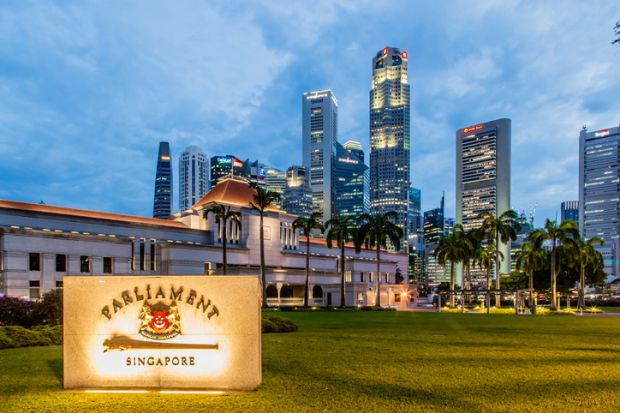A Singaporean MP has called the disinvitation of speakers at university events “concerning”, after raising the issue in parliament.
Earlier this month, Jamus Jerome Lim, who represents the Sengkang constituency as a member of the opposition Workers’ Party, asked the minister of education, Chan Chun Sing, if he could confirm “that incidents of disinvitations of speakers and cancellations of events at the autonomous universities [were] not due to advisory or instructions transmitted by the ministry”.
Speaking to Times Higher Education, Dr Lim, associate professor of economics at ESSEC Business School, said his question was in part prompted by the disinvitation of academic Sol Iglesias from a panel at the National University of Singapore.
Dr Iglesias, assistant professor of political science at the University of the Philippines, believes she was dropped from the panel because of her marriage to the Singaporean historian and democracy activist Thum Ping Tjin, also known as PJ Thum.
Responding to Dr Lim, the government said that Singapore’s autonomous universities (AUs) “are aware that they must respect Singapore’s wider social norms and act in line with national interests,” adding: “Where necessary, the Ministry will advise the AUs to uphold these principles.”
“The fact that [the ministry] ‘advises' AUs on the need to ‘respect Singapore’s social norms and national interests’ means that it does, in fact, channel advisory on speakers, which in turn also suggests that it may issue guidance on disinvitations, even if the universities ultimately make the final call,” Dr Lim told THE. “The issue here is that what [the ministry] may consider acceptable discussion is vague and opaque.
“As an advanced, knowledge-driven economy, it is critical that diverse ideas are allowed to circulate and be subject to debate. Even if these may come across as contrary to the national interest, so long as the arguments are made in a civil, respectable manner, and do not instigate violence, I believe that they should be entertained,” he continued, calling the academic freedom implications of Dr Iglesias’ disinvitation “the most concerning and fundamental part of the incident”.
“This is the only way we can iterate toward the short of ideas and knowledge that will ultimately make our economy and society stronger and more robust,” Dr Lim added. “Innovation – even in the hard sciences – often requires the challenging of conventional wisdom and social norms.”




